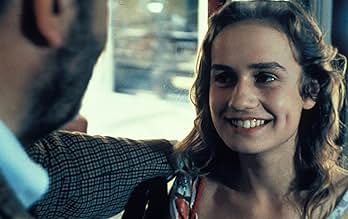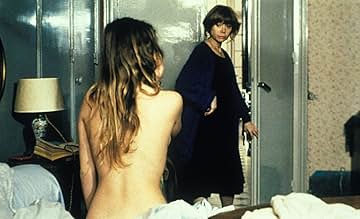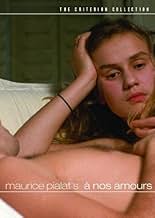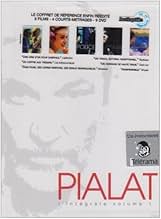VALUTAZIONE IMDb
7,1/10
7537
LA TUA VALUTAZIONE
La famiglia di una giovane donna cerca disperatamente di controllare il suo comportamento sempre più provocante.La famiglia di una giovane donna cerca disperatamente di controllare il suo comportamento sempre più provocante.La famiglia di una giovane donna cerca disperatamente di controllare il suo comportamento sempre più provocante.
- Regia
- Sceneggiatura
- Star
- Premi
- 4 vittorie e 3 candidature totali
Recensioni in evidenza
Being so restrained, blunt and straightforward, Pialat's film is also enormously touching. The concreteness of the world he creates here is tangible. Psychological realism true in each detail, and as ensemble. The brutal restraint is somehow disconcertingbeing given the bad habits inflicted by the standard psychology of most other films. Pialat's project was a naturalist one, hence the impression of a thing just begun, just started, still in progress. (It would be, anyway, absurd and stupid to try reducing Pialat's implicit aesthetics to some theoretical statements and criticism's clichés.) What is obvious is that Pialat achieved his aimfinding the fourth dimension of this coming of age story. For me,Pialat might not be worthy of love; he is certainly worthy of respect. In his moviesnot only in this one, but in several others as wellone finds not only probitybut also genuine power, inspiration, the strength of a secret master, Pialat. Good and serious director, keen psychologist, avid of femme's perfume and scent, intelligent and uncompromising.
In psychology, Pialat rightly perceived the distances and the gaps and ,as it were, the laws of the perspective. In this movie, Pialat uses this sensational and hidden knowledge to tell the tribulations of a gamine.
The amazing lead actress is worth seeing; with her, the film took one more chance at the ineffable.
Any movie is made with elements,but it lives out of the rapports and the ideas.On the cinematographic elements' level,Pialat's movie is austere.There is no bit of stylization,but each element has a 4th. dimension:the rapports' level.This dimension is widened by the music.Purcell's suitable music gives the action a strange coherence.The movie is made out of relations,rapports,reflections.Far from being some kind of a flat realism,Pialat's movie lives entirely out of this wealth of thought.
Most important,this strengthener,firm,intelligent,bitter,even poignant realism is not fake.
A courageous decision is the refusal of all stylization.(The "cruel movie",the ferocious movie relies on stylization.)True realism means ideas,reflection,a lively mind.Far from being mechanical and passive,it is fertile and elastic.
This movie is also a medicament.
I find it disappointing that only 3 comments were written here for "À nos amours ".Also,the weighted average vote of 7.5 / 10 is unfair.
Miss Bonnaire is a standout.Her cinema presence in "A Nos ..." surrounds the viewer.
In psychology, Pialat rightly perceived the distances and the gaps and ,as it were, the laws of the perspective. In this movie, Pialat uses this sensational and hidden knowledge to tell the tribulations of a gamine.
The amazing lead actress is worth seeing; with her, the film took one more chance at the ineffable.
Any movie is made with elements,but it lives out of the rapports and the ideas.On the cinematographic elements' level,Pialat's movie is austere.There is no bit of stylization,but each element has a 4th. dimension:the rapports' level.This dimension is widened by the music.Purcell's suitable music gives the action a strange coherence.The movie is made out of relations,rapports,reflections.Far from being some kind of a flat realism,Pialat's movie lives entirely out of this wealth of thought.
Most important,this strengthener,firm,intelligent,bitter,even poignant realism is not fake.
A courageous decision is the refusal of all stylization.(The "cruel movie",the ferocious movie relies on stylization.)True realism means ideas,reflection,a lively mind.Far from being mechanical and passive,it is fertile and elastic.
This movie is also a medicament.
I find it disappointing that only 3 comments were written here for "À nos amours ".Also,the weighted average vote of 7.5 / 10 is unfair.
Miss Bonnaire is a standout.Her cinema presence in "A Nos ..." surrounds the viewer.
Others have already said that "À nos amours" is a great film, even more have said that Sandrine Bonnaire was a knockout in her demanding rôle as Suzanne. There is a sort of timeline, a beginning and an end, but this is really a film about a personal journey through a part of Suzanne's late adolescence. Young people who have watched the film recently are sometimes very annoyed with Suzanne, but this only proves that Miss Bonnaire has made them care about her character even to the point that they perhaps want to shake her, to take her into a corner and tell her what mistakes she is making. There is also a conflict which some pretend had disappeared by the end of the "swinging sixties" - the generation gap between the sexual mores of parents and adolescents, which was of course still real in the early eighties and remains so in many cultures. Unpredictable behaviour (by Suzanne's brother, for example) is also a real part of family life for many young people. Every time I watch the film (and I have seen it very often, as I used it in my French classes more than once) I notice details which had escaped me or which I had forgotten. Pialat made other great films, but "À nos amours" remains my favourite. If possible watch it in French, with subtitles if necessary - but see it before you die!
10bob998
Let me get it off my chest now: I'm very disappointed in the lack of notice given Pialat's films. Why am I only the fifth person to review À nos amours, and not the 500th? This is the sixth feature by Pialat, and it is a masterpiece. The travails of Suzanne and her family have universal implications; if you think only of her relations with her brother Robert--violent at times, yet often tender and half-incestuous--that's enough material for a film in itself. Some people are bothered by the promiscuous nature of Suzanne's love life, how she just doesn't behave like a regular teenage girl should. I have met a girl like her.
About two-thirds of the way through, we are confronted with a scene of astonishing virtuosity: the party at the family home, into which erupts the absent father, played by Pialat himself. The script the actors had been given gave no notice of this plot turn; it is fascinating to watch eight actors dealing with this incredible event--no one blows the scene, no matter how dumbfounded they must have been. For about ten minutes, we get pure acting, or reacting, however you want to put it. This is the kind of film event that makes movies worthwhile.
Bonnaire is tremendous, it's one of the greatest debuts in film history. Pialat as the father is great, all the more remarkable in that he had never acted before. The dimple scene is wonderful. Dominique Besnehard has to bring off an unsympathetic role as the brother, and he performs very well.
About two-thirds of the way through, we are confronted with a scene of astonishing virtuosity: the party at the family home, into which erupts the absent father, played by Pialat himself. The script the actors had been given gave no notice of this plot turn; it is fascinating to watch eight actors dealing with this incredible event--no one blows the scene, no matter how dumbfounded they must have been. For about ten minutes, we get pure acting, or reacting, however you want to put it. This is the kind of film event that makes movies worthwhile.
Bonnaire is tremendous, it's one of the greatest debuts in film history. Pialat as the father is great, all the more remarkable in that he had never acted before. The dimple scene is wonderful. Dominique Besnehard has to bring off an unsympathetic role as the brother, and he performs very well.
For many, the lack of a defined storyline is maddening, often resulting in a less than satisfying experience. Almost stream-of-consciousness in its approach, Maurice Pialat's À Nos Amours does not appear to have much story structure, but the story is most definitely there and is related with a subtlety not often found in modern film.
Bonnaire's portrayal of Susanne is brilliant (as others have said), and her almost wistful sadness permeates the performance. In one scene, her father (played by Pialat) says, "You never smile anymore," indicating the transformation of Susanne from innocence to experience. The men in her life are shown only for the time she is with them. There is neither introduction upon their arrival nor explanation as to their departure. Pialat uses this method to show Susanne's lack of emotional investment in these temporary romances.
The only men who do return are her father, her brother, and Luc, her one real love. It is when she is with these men that she shows her true self, rather than the detached uncaring girl who sleeps around in an effort to replace them. The dialogue drives this film. There is little music, save the inspired use of Klaus Nomi's "The Cold Song". The sad wailing of Nomi's pseudo-operatic vocal against the opening credits of Susanne in the pulpit of a boat is a wonderful moment.
Long out of print, this film is now available on DVD. It is deserving of a look by the discerning cinephile who may have missed it 25 years ago.
Bonnaire's portrayal of Susanne is brilliant (as others have said), and her almost wistful sadness permeates the performance. In one scene, her father (played by Pialat) says, "You never smile anymore," indicating the transformation of Susanne from innocence to experience. The men in her life are shown only for the time she is with them. There is neither introduction upon their arrival nor explanation as to their departure. Pialat uses this method to show Susanne's lack of emotional investment in these temporary romances.
The only men who do return are her father, her brother, and Luc, her one real love. It is when she is with these men that she shows her true self, rather than the detached uncaring girl who sleeps around in an effort to replace them. The dialogue drives this film. There is little music, save the inspired use of Klaus Nomi's "The Cold Song". The sad wailing of Nomi's pseudo-operatic vocal against the opening credits of Susanne in the pulpit of a boat is a wonderful moment.
Long out of print, this film is now available on DVD. It is deserving of a look by the discerning cinephile who may have missed it 25 years ago.
15-year old Suzanne (Sandrine Bonnaire) is a precocious child, living with her mother, her career-driven brother, and her sometimes overbearing father (played by Maurice Pialat). She has recently split from her boyfriend and is intent on moving from man to man in search of sexual pleasures and guardianship. When her father splits from her mother and moves out, home life becomes unbearable as her mother and brother disapprove of her lifestyle. She is most comfortable in the arms of a man, be it one of her seducers or her father. Men seems to flock to her, as she is pretty, charming and is happy to accommodate her admirers.
This is the second film that I've seen directed by French master Maurice Pialat, the other being the excellent L'Enfance Nue. They are both similar films in terms of themes and execution, and tell the familiar coming-of-age story from an original perspective. Whereas the former was a sledgehammer portrayal of a young juvenile causing havoc amongst the various foster homes he was placed, where redemption never seems possible, A Nos Amours' Suzanne is a more sympathetic lead character, and her journey is portrayed in a more subtle manner. While it would be shocking to hear of a 15 year old girl bedding a number of men, Pialat is more focused on what drives her to act this way.
She is not a tease, and she doesn't flaunt her body to anyone who will look. Instead, she seems to simply enjoy the comfort of a man. When the father moves away, her home life falls apart and her bed-mates increase. Perhaps Pialat is trying to portray the impact an absent father can have on a child, or that all women need comforting every once in a while. Or maybe this is an individual character study, with no overriding message. What it most definitely is, though, is a wonderfully acted (especially from the young Bonnaire), intelligent, and intriguing film that has Pialat's usual cold detachment alongside a certain intimacy with the lead character.
www.the-wrath-of-blog.blogspot.com
This is the second film that I've seen directed by French master Maurice Pialat, the other being the excellent L'Enfance Nue. They are both similar films in terms of themes and execution, and tell the familiar coming-of-age story from an original perspective. Whereas the former was a sledgehammer portrayal of a young juvenile causing havoc amongst the various foster homes he was placed, where redemption never seems possible, A Nos Amours' Suzanne is a more sympathetic lead character, and her journey is portrayed in a more subtle manner. While it would be shocking to hear of a 15 year old girl bedding a number of men, Pialat is more focused on what drives her to act this way.
She is not a tease, and she doesn't flaunt her body to anyone who will look. Instead, she seems to simply enjoy the comfort of a man. When the father moves away, her home life falls apart and her bed-mates increase. Perhaps Pialat is trying to portray the impact an absent father can have on a child, or that all women need comforting every once in a while. Or maybe this is an individual character study, with no overriding message. What it most definitely is, though, is a wonderfully acted (especially from the young Bonnaire), intelligent, and intriguing film that has Pialat's usual cold detachment alongside a certain intimacy with the lead character.
www.the-wrath-of-blog.blogspot.com
Lo sapevi?
- QuizIn the original script, the father was due to die and was not scheduled to return at the time of the dinner scene. Maurice Pialat walked into the scene and left the actors to improvise in a situation they hadn't planned for.
- BlooperIn the sequence with the American, Suzanne's outfit changes from a one-shoulder black dress with white stripes trimming just the top of the bodice, to a one-shoulder black&white striped top with a black skirt, and back again.
- ConnessioniFeatured in Sebastian (2024)
I più visti
Accedi per valutare e creare un elenco di titoli salvati per ottenere consigli personalizzati
- How long is To Our Loves?Powered by Alexa
Dettagli
- Data di uscita
- Paese di origine
- Siti ufficiali
- Lingue
- Celebre anche come
- To Our Loves
- Luoghi delle riprese
- Cité Bergère, Paris 9, Parigi, Francia(Suzanne and Jean-Pierre looking for a hotel)
- Aziende produttrici
- Vedi altri crediti dell’azienda su IMDbPro
Botteghino
- Lordo in tutto il mondo
- 2575 USD
Contribuisci a questa pagina
Suggerisci una modifica o aggiungi i contenuti mancanti































